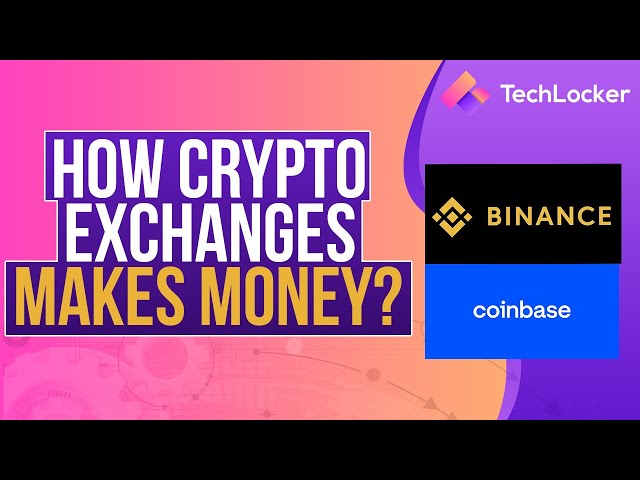Best Exchanges for Crypto Casino Players
Get your coins 🪙Crypto exchanges are exactly what they sound like - a digital marketplace where you can buy, sell, and exchange cryptocurrencies. It's usually the step 1 for crypto casino players. Learn what crypto exchanges are, how to use them, and the best ones for you.

What are Crypto Exchanges?
Putting it very simply, today’s crypto exchanges provide an easy way for people to buy, sell, and trade cryptocurrencies and other digital assets. Most offer simple ‘fiat onramps’, enabling you to either deposit into an account and then easily spot trade, or even just buy crypto directly using your debit/credit card (higher fees are usually charged for this).
The bigger crypto exchanges, like Binance and Coinbase, have also expanded into other areas of the cryptosphere, offering stand-alone wallets, their own tokens and blockchains, and a range of DeFi products – but we’ll cover those in detail on their own pages.
How Do Crypto Exchanges Work?
The underlying technology of cryptocurrency exchanges involves a combination of financial trading mechanisms, security protocols, and blockchain technology. Here’s a breakdown of the key components.
Blockchain Technology
Cryptocurrencies operate on blockchain technology, which is a decentralized ledger that records all transactions across a network of computers. Each transaction in a cryptocurrency’s blockchain is verified and added to a block, which is then linked to the preceding block, forming a chain.
Blockchain ensures transparency and immutability, meaning once a transaction is recorded, it cannot be altered or deleted.
Trading Engine
The core of any exchange is its trading engine. It’s responsible for matching buy and sell orders, executing trades, and updating order books. The trading engine must be fast and efficient to handle a large volume of transactions and to ensure the timely execution of trades.
Smart Contract Functionality (for Decentralized Exchanges)
Decentralized exchanges (DEXs) operate on smart contracts, which are self-executing contracts with the terms of the agreement directly written into code. Smart contracts facilitate, verify, and enforce the negotiation or performance of a contract, allowing for trustless and decentralized trading.
User Interface (UI)
The UI is what users interact with. It includes everything from the registration process to the trading dashboard. A well-designed UI is user-friendly and provides traders with various tools like charting, order types, trade history, and real-time price updates.
Order Book
The order book is a real-time list of buy and sell orders on the exchange. It’s organized by price level and is continuously updated as new orders are placed and old ones are fulfilled or cancelled. A sophisticated algorithm is used to match buy and sell orders. The algorithm determines how orders are prioritized and matched (e.g., first-come-first-serve, price-time priority).
Wallet Integration
Exchanges offer integrated digital wallets where users can store their cryptocurrencies.
Wallets are connected to the blockchain and allow users to send and receive cryptocurrencies.
Security Measures
Security is crucial for protecting users’ funds and personal information. This includes two-factor authentication (2FA), encryption, and regular security audits. Many exchanges also use cold storage to keep a significant portion of cryptocurrencies offline, where they are less vulnerable to hacking.
The combination of these technologies allows crypto exchanges to facilitate secure and efficient trading of digital assets.
What is Market Cap?
“Market Cap,” short for Market Capitalization, is a term commonly used in finance, particularly in relation to companies and cryptocurrencies. It represents the total market value of a company’s outstanding shares of stock or, in the case of cryptocurrencies, the total value of a particular cryptocurrency in circulation.
| Did You Know? |
|---|
| To calculate the market cap of a publicly traded company, you multiply the current market price of a single share by the total number of outstanding shares. Stock Formula: Market Cap = Current Share Price × Total Number of Shares Outstanding For a cryptocurrency, the market cap is calculated by multiplying the current price of the cryptocurrency by the total number of coins or tokens that have been mined and are in circulation. Crypto Formula: Market Cap = Current Price of Cryptocurrency × Circulating Supply |
Market cap is used to gauge a company’s size and helps investors make informed decisions about the risk and return potential. It’s a fundamental metric in stock valuation. In the context of cryptocurrencies, market cap helps in assessing the relative size of one cryptocurrency compared to others. It indicates the dominance and popularity of a cryptocurrency but does not necessarily reflect its stability or value as an investment.
Are Crypto Exchanges Legal?
Like so many things in crypto, the legality of exchanges can be something of a gray area. As such, most crypto exchanges will provide services to users in most countries. However, certain countries do have clear restrictions.
For example, only crypto exchanges registered in the United States are legally allowed to provide services to US residents, which is why international exchanges like Binance have established separate exchanges to service the United States. Even so, there are further restrictions on a state-by-state basis. Other countries, like China, have outlawed crypto exchanges altogether.
Because crypto regulations and laws are constantly evolving, you should always check the current status of your local regulations before using a crypto exchange.
Crypto Exchanges and Tax
No one likes to think about tax, but you should keep it in mind when using crypto exchanges. Depending on where you live, and which specific cryptocurrencies you buy, sell and trade, you may have tax reporting responsibilities. And, there’s no denying it, crypto tax reporting can get complicated – especially in the United States. But, if you don’t report your crypto affairs, it can lead to a whole world of grief.
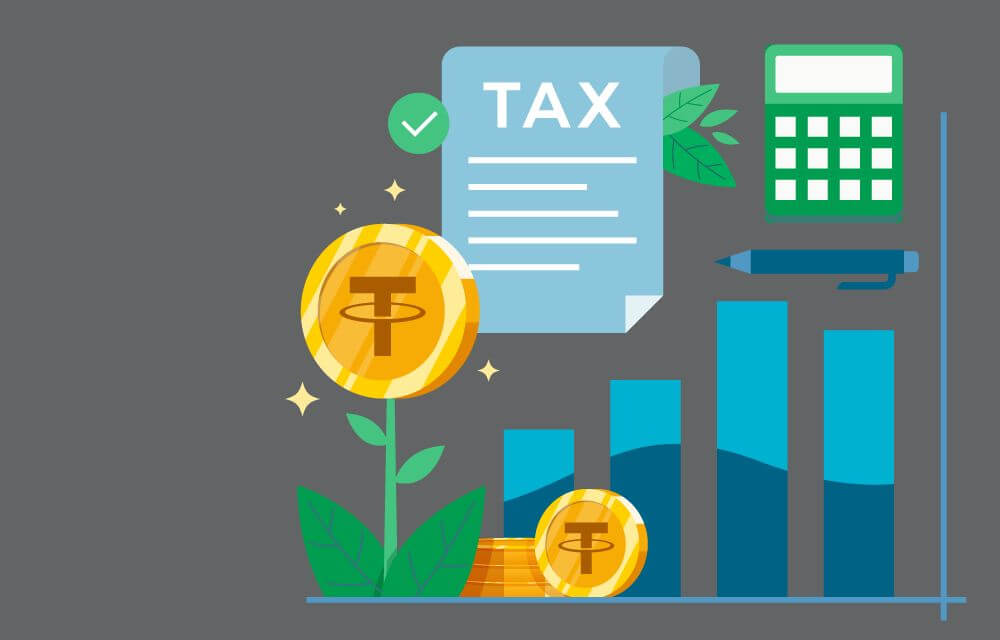
Given this, you may want to seek expert advice from a financial advisor before you start trading or investing in crypto. Some crypto exchanges will provide specific tax reporting help (again, especially those serving US residents). But, remember, you can’t hide. Centralised crypto exchanges are legally required to provide information about their users to tax authorities in many jurisdictions.
Are Crypto Exchanges Safe?
This is an incredibly tough question to answer. In a nutshell, they should be, and they probably will be at some point. But, there’s no way to ignore that using centralised crypto exchanges can be risky. So, let’s take a quick look at some of the famous crypto exchange disasters, and what you can do to avoid being caught up in one.
Mt Gox, Quadriga and FTX
In terms of safety, while the collapse of Japan-based Bitcoin exchange Mt. Gox in 2014, and Canada-based trading platform Quadriga in 2019, can be at least partially attributed to the immaturity of the sector, the collapse of FTX in 2022 is a different story.
FTX.com and FTX.US combined, were at the time, the world’s second-biggest crypto exchange. Founded by prolific American crypto entrepreneur and Democratic donor Sam Bankman-Fried (SBF), the exchange collapsed spectacularly in November 2022 – going from a $32 billion valuation to essentially zero in a matter of days.
The twisted web that SBF wove between FTX, his trading firm Alameda Research, and hundreds of other corporate entities is beyond the scope of this guide, but the fact that such a high-profile exchange collapsed has changed everything. FTX sponsored sports arenas and teams, advertised at the Super Bowl, lobbied congress and its US division was, apparently, compliant with US regulatory authorities. But it still collapsed, taking the deposits of millions with it.
Lessons Learned: How to Use Crypto Exchanges Safely
The main takeaway from past crypto exchange dramas is that you can’t really trust anyone. This sounds cynical, but it’s true. Unlike banks that are based in specific countries, have to comply with well-established regulations, and provide deposit insurance, even centralised crypto exchanges based in stable countries are not well regulated.
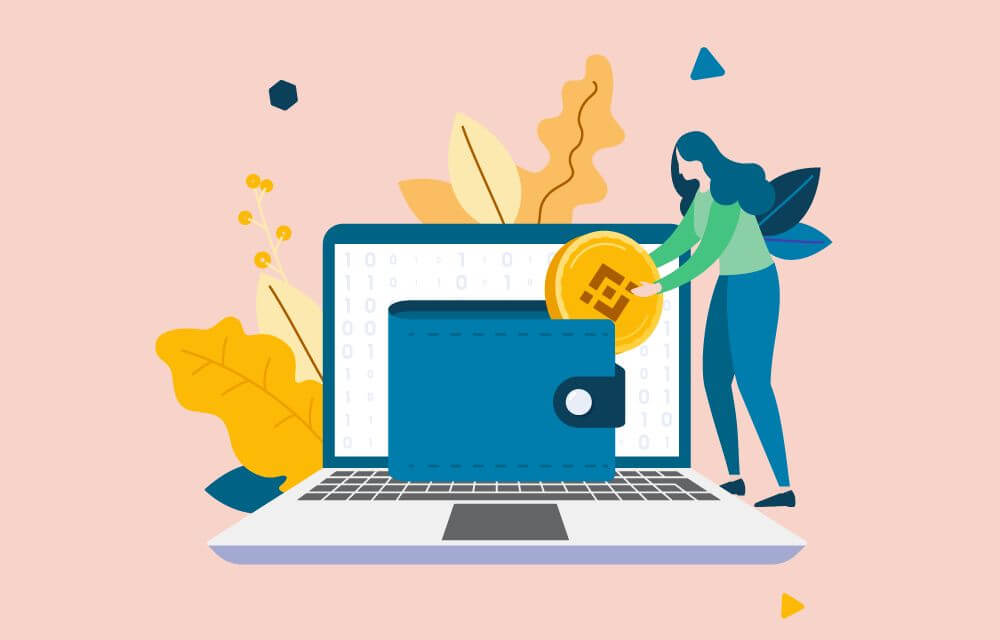
Their vulnerability isn’t necessarily their fault – it is currently virtually impossible to obtain complete insurance coverage for crypto deposits, and because of the volatile nature of crypto assets, a temporary liquidity issue can rapidly turn into a terminal solvency crisis. Despite this, the convenience and ease of use of centralised exchanges mean they are still a useful option for buying and trading cryptocurrencies and digital assets.
- Research an exchange carefully before using it. Read about its history, who runs it, where they are based, and who regulates it. You can check out our handy guides to the major crypto exchanges here.
- Never leave more crypto on an exchange than is needed for your trading or immediate use. Always transfer your crypto to a non-custodial wallet as soon as possible. Check out our crypto wallet guides here.
- Always keep up-to-date with the latest crypto news. Be ready to act quickly if there are signs of trouble. You can keep up with the latest crypto news here.
How Do We Review Crypto Exchanges?
At CryptoSpinners, we delve deep into each crypto exchange, leveraging our expertise to provide you with comprehensive and trustworthy reviews.
1. We check how secure they are
We rigorously evaluate an exchange’s security measures, including encryption standards, two-factor authentication, and cold storage practices, to ensure your digital assets are safe.
2. We test the usability of the platform
Our team personally navigates each platform, assessing the user interface and experience to guarantee that it’s intuitive and user-friendly for both beginners and experienced traders.
3. We review the amount of fees they take
We meticulously analyze and compare the fee structures, including trading, withdrawal, and deposit fees, to ensure transparency and fairness in your trading endeavors.
4. We look at the list of coins they offer
We scrutinize the variety and breadth of cryptocurrencies offered, ensuring a wide range of options for diverse investment strategies. For more details, visit our cryptocurrencies page.
5. We examine tax information they provide
Understanding the importance of tax compliance, we evaluate the resources and tools exchanges provide to help users with their cryptocurrency tax obligations.
| Did You Know? |
|---|
| A study by CipherTrace reported that cryptocurrency crime losses reached $4.5 billion in 2019, highlighting the critical importance of robust security measures on crypto exchanges. |
What types of crypto exchanges are there?
Before we go any further, it is useful to understand that although the platforms we are going to talk about are all commonly called ‘crypto exchanges,’ that isn’t strictly accurate. Most do offer true exchange services, but more commonly act as brokers.
That is, traditionally, a financial or commodity exchange acts as a market maker, matching trades. However, most crypto exchanges today act more like banks or brokers because they directly transact with clients – i.e., they take your deposited funds into their accounts and then give you other funds out of their accounts. This is important to remember for reasons we will explain later.
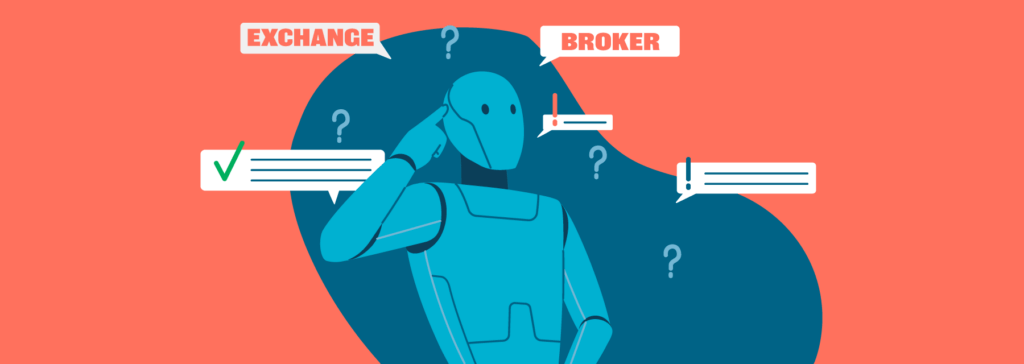
The Difference Between Centralised and Decentralised Exchanges
There are two main categories of crypto exchange: centralised (CEXs) and decentralised (DEXs). Simply put, centralised exchanges are operated by a single entity, like a company, with a traditional (though sometimes very opaque and convoluted) structure. On the other hand, decentralised exchanges operate entirely on smart contracts, and are often run by DAO (decentralised autonomous organisations). They have no centralised structure.
On the whole, centralised exchanges tend to be much more user-friendly, with websites and user interfaces that are very much like traditional banks and trading platforms. They normally provide on-exchange custodial wallets, meaning you can let the platform take custody of your assets – much like how you keep money in a bank account.
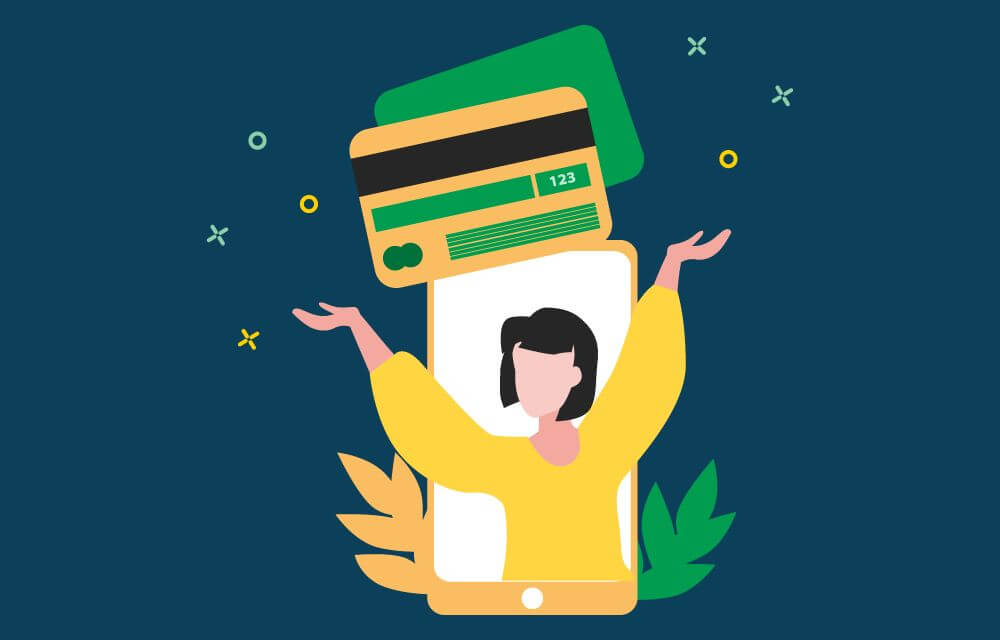
This is very convenient but means you are trusting another party with your funds. Unfortunately, because the crypto space is not very well regulated in many countries if the company goes bust, as happened with famous exchanges like Mt.Gox and more recently FTX, you can lose your funds.
Decentralised exchanges are much safer to use because they do not take custody of your funds, but tend to be rather user-unfriendly, with more complicated interfaces. However, they are improving. They also tend to be much cheaper to use, so it can be worth taking the time to get to grips with them.
You can find out more about decentralised crypto exchanges on the DeFi page.
Popular Centralised Crypto Exchanges
Below are some of the most popular centralised crypto exchanges:
Popular Decentralised Crypto Exchanges
Below are some of the most popular decentralised crypto exchanges:
- Uniswap
- SushiSwap
- PancakeSwap
- Curve Finance
- Balancer
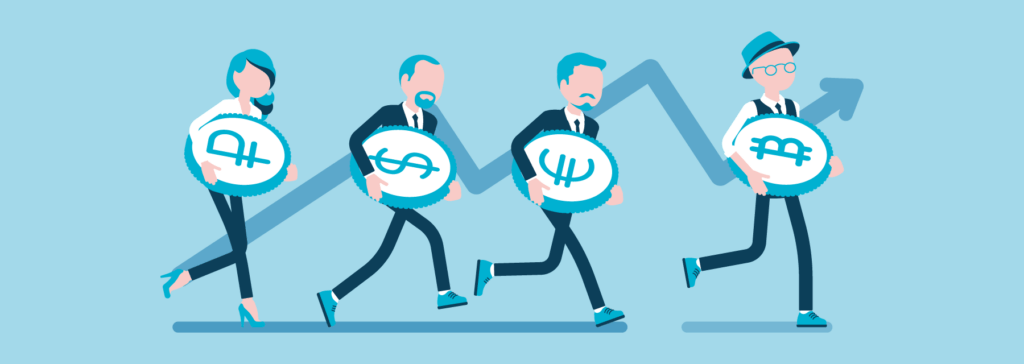
Fan Token Exchanges and Platforms
Although fan tokens can be purchased and traded on many crypto exchanges, there are also some dedicated platforms. These provide specialised marketplaces, customised for fan token owners and traders.
The biggest of these is Socios.com. It runs on the Ethereum-based Chiliz blockchain, and uses the CHZ token to power its ecosphere. You can use CHZ to purchase fan tokens directly via the marketplace on Socios.com, and also trade CHZ on crypto exchanges.
Some larger crypto exchanges, like Binance, have also established dedicated fan token platforms. You can read more about fan tokens on our dedicated guide page.
A Few Alternatives to Crypto Exchanges
While crypto exchanges are a popular choice, there are several other methods for acquiring cryptocurrencies. These alternatives offer different advantages and can be explored in detail on our How to buy crypto page.
1. P2P
Peer-to-Peer (P2P) platforms facilitate direct transactions between individuals, allowing users to buy and sell cryptocurrencies without a centralized intermediary.
2. Bitcoin ATM
Bitcoin ATMs are physical machines where you can buy Bitcoin and other cryptocurrencies using cash or a debit card. For more information, visit our Bitcoin review page.
3. Direct on-ramp
Direct on-ramps are services that allow you to purchase cryptocurrencies directly through their platforms, often integrated within wallets or other crypto services.
4. Mining
Mining involves using computer hardware to solve complex mathematical problems, validating transactions on the blockchain and earning cryptocurrencies in return.
| Did You Know? |
|---|
| As of 2021, there are over 14,000 Bitcoin ATMs worldwide, showcasing their growing popularity as an alternative method for buying cryptocurrencies. This expansion reflects the increasing mainstream acceptance of Bitcoin and other digital currencies. For more details, you can view the current statistics here. |
3 Popular Crypto Exchanges for Crypto Casinos
For those interested in crypto casinos, choosing the right crypto exchange is crucial for seamless transactions. Discover more about crypto casinos here.
- Binance – Low fees (0.1% trading fee) – Over 150 cryptocurrencies available. Read our detailed Binance review.
- Coinbase – Fees vary, typically around 1.49% for standard buys – Offers around 50 cryptocurrencies. Check out our comprehensive Coinbase review.
- Kraken – Fees range from 0% to 0.26% per trade – Supports over 70 cryptocurrencies. View the full Kraken review.
Why are crypto exchanges important to casino players?
Crypto exchanges are vital for casino players as they offer the easiest and most accessible way to acquire cryptocurrencies, especially for those new to the digital currency world. They provide a gateway to obtain various cryptocurrencies needed to participate in crypto casinos.
Final Thoughts
In summary, the world of cryptocurrency exchanges is diverse, each offering unique features and services. Whether it’s assessing the security measures, understanding the fee structures, or exploring the variety of cryptocurrencies offered, choosing the right exchange is crucial for a safe and effective crypto experience. For those interested in crypto casinos, selecting an exchange that aligns with their needs is equally important. Remember, staying informed and choosing exchanges with a strong track record and transparent practices is key to navigating the crypto landscape confidently.

